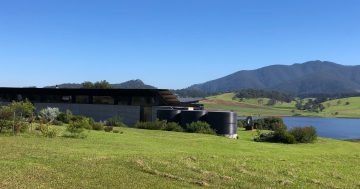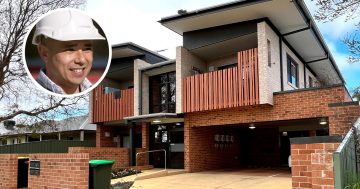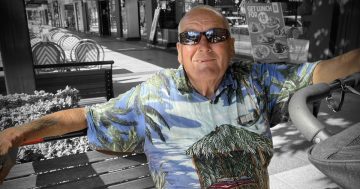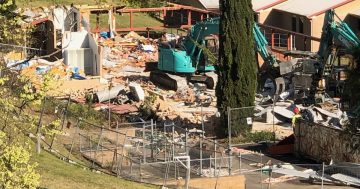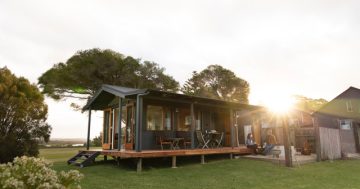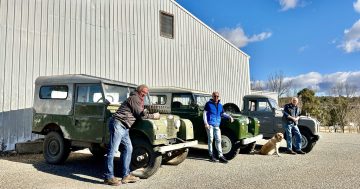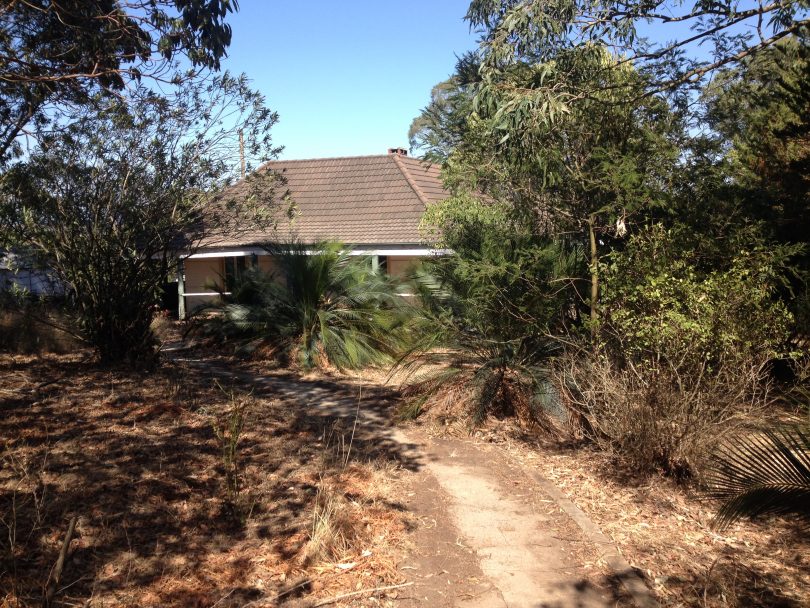
Rose Cottage is more of a sprawling rabbit warren of rooms after a series of additions but documents for the property date to the 1880s. Photo: Elka Wood.
So I’ve been living off-grid for a month now. Not off-grid in the sense of using an alternative energy source but just not having any electricity in our house at all.
This is because my husband and I, along with my parents, bought a very badly run-down old house in Bega where the main electrical line has been severed, presumably by its irate owners who were tired of paying the bill.
Abandoned for 10 years, with a long history of squatters and a resident possum, Rose Cottage is best described as having “a lot of potential”.
Making the cut to the power line looks like it was easy but getting it reconnected has been time-consuming and, six weeks after first applying for a new metre from the energy company, we’re still waiting.
Fingers crossed and wishing for the best, we moved in any way.
Last week, the electrician told me bluntly “you won’t get connected before Christmas”.
I was fairly terrified of the idea of living electricity-free before we moved in. I love to wake up to a hot shower and settle in to Netflix in the evening. I also love to bake and it’s Christmas! Baking season! With no oven!
I also adore my electric toothbrush, which has saved me hundreds in dentists bills over the last few years.
From the light of our cozy rental, I pictured dark and depressing evenings at the new house, which is not only dirty but has a maze of added-on rooms with nail-studded and slumping floors, which give the effect of being slightly drunk as you veer to one side.
Living without electricity makes me think of the not-so-distant past, somewhere between caves and cottages when you had to snatch up a candle to call on your sick relatives and there was no light, and no warmth to bring comfort during times of hunger, loss and war.
It also makes me wonder about the future.
Some of our anxiety about natural disaster and climate change is linked to a fear of being cut off from things we use every day and rely on.
What if I need something and think it will be there, and it’s not?
But while I was nervous, I was also deeply curious about the challenge of camping in our own house. My husband and I both grew up rurally with little to no electricity, especially in our early childhoods, so out of everyone, surely we could adjust?
And adjust we have, although we couldn’t have done this without the kindness of friends who have invited us over for dinner (and a shower!) or left out the spare key so we could use the washing machine.
We’ve got a two-burner gas camping stove and a tiny gas fridge, and the house is a five-minute walk from shops, so we get to feel very french, buying only the fresh food that we need for one day.
There are lots of things I love about our situation right now. Like the soft glow of the battery-powered lamp which we read by at night and the fact that if the devices run out of batteries over the weekend, we just don’t use them.
Not having the internet at home, except via phones, makes me less likely to spend hours zoning out online.
I also like using community spaces and resources more. It feels a bit cheeky charging my toothbrush at the library or coffee shop but it’s also pretty funny and makes me feel grateful and aware of the things I use power for.
A cold shower requires mental strength to follow through with but, just like a plunge in the ocean, is something you never regret.
We’re more resilient than we think.
Like when you watch a toddler fall headfirst down a flight of stairs, bumping everything and getting a split lip along the way and after a good howl, they’re sucking on an ice cube and talking about ducks while you’re wondering how it is that you’re not on your way to hospital.
While there are places where the thought of having no power is truly alarming, like hospitals, I’d happily go without it at home most days, especially if there was the option to use community power sources and have solar hot water and alternative heating, like a woodstove.
I don’t recommend severing your power line but if you’re feeling bold, give it a go by turning your power off for a week this summer.
I found that living as we did in the past – and might in the future – is not as scary as I thought.
In fact, it’s peaceful.







